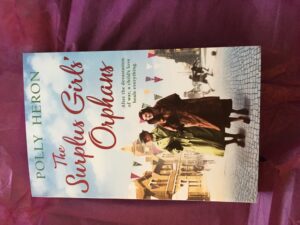Much as I enjoyed Polly Heron’s The Surplus Girls, I can honestly say that The Surplus Girls’ Orphans is the best saga I have read. The restricted lives of women in the inter-war period is captured perfectly, but with a fresh eye and brilliant story-telling that avoids the ‘grit and grim’ which I find makes some sagas less than a pleasure to read.
 I know, as a writer, that the essential structure of a saga is to pour increasingly huge problems onto the heroine, twisting and turning the plot until she (apparently) has no way out. But of course, as a reader, you know she will find one. While all the time I find myself wondering how much more of the unremitting misery I can take.
I know, as a writer, that the essential structure of a saga is to pour increasingly huge problems onto the heroine, twisting and turning the plot until she (apparently) has no way out. But of course, as a reader, you know she will find one. While all the time I find myself wondering how much more of the unremitting misery I can take.
Polly Heron’s books are not like that. There is joy and beauty in small things; in the orphans playing pirates on a wet evening, in the barley-sugar legs of a washstand, in children dancing around a maypole. And the plots and subplots are so beautifully drawn together than even when life is incredibly tough – which was, after all the reality of the time – as a reader you are led from one storyline to another without ever having time to get depressed. Angry, frightened, heart-warmed, amused… but never down right miserable.
Drawing on some of the characters in The Surplus Girls, and still wound into the story of the Miss Hesketh’s business school, The Surplus Girls’ Orphans is a standalone novel in its own right, although readers will get more out of the story having read the first book. As well as the Hesketh family, two of the Layton children feature, also as Mrs Atwood, and of course the backdrop is still the Chorlton area of Manchester.
However there is an entirely new main character in the form of Molly Watson, who is suffering perhaps the longest engagement ever, to a penny-pinching, controlling man. Deciding she would rather be a surplus girl, to the horror and shame of her family she breaks free to find work in an office, and then the orphanage, where she looks to change the lives of those around her and not just her own.
Her relationship with Aaron Abrams unfolds beautifully; the initial misunderstandings never overdone, the attraction between them perfectly paced. Nothing is sugar-coated and although the ending is perhaps inevitable (as it has to be to satisfy the genre) their journey feels unforced in a way all the best fictional romances do.
 The subplots work perfectly too, in symmetry with the main story. A single thread connects Molly and the Hesketh household as secrets are revealed, with certainly some big surprises along the way. And Jacob Layton’s bullying at the hands of the inescapable thug Shirl brings an at times terrifying tension to the book.
The subplots work perfectly too, in symmetry with the main story. A single thread connects Molly and the Hesketh household as secrets are revealed, with certainly some big surprises along the way. And Jacob Layton’s bullying at the hands of the inescapable thug Shirl brings an at times terrifying tension to the book.
Polly Heron has tremendous skill as a story-teller, but on top of that the quality of her writing shines through. She has a knack of wasting not a word on description, but of weaving detail into the action so the reader had a perfect mental image of a place and time as the story unfolds around them.
Overall, this is a brilliant book. I smiled when I read the acknowledgments, seeing that some of it had been written while we were on a retreat in Bath. I clearly remember Polly at the kitchen table, writing in longhand in a large notebook, and it is gratifying to think that as well as friendships, such a fabulous novel was forged at that time.
